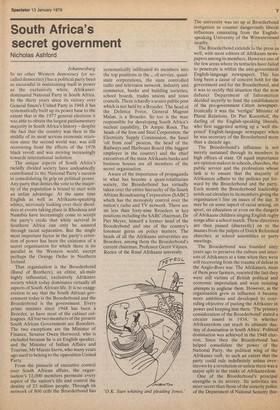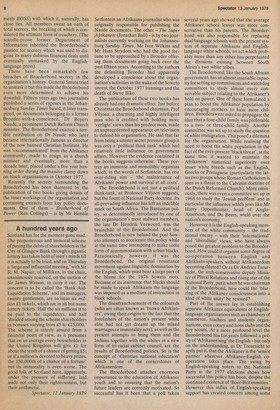South Africa's secret government
Nicholas Ashford
Johannesburg In no other Western democracy (or socalled democracy) has a political party been so successful in maintaining itself in power as the exclusively white, Afrikanerdominated National Party in South Africa. In the thirty years since its victory over General Smuts's United Party in 1948 it has systematically built up its power base to the extent that in the 1977 general elections it was able to obtain the largest parliamentary majority in South Africa's history — despite the fact that the country was then in the middle of its most serious economic recession since the second world war, was still recovering from the effects of the 1976 black revolt and was moving increasingly towards international isolation.
The unique aspects of South Africa's racially divided society have undoubtedly contributed to the National Party's success in consolidating its grip on political power. Any party that denies the vote to the majority of the population is bound to start with an unfair advantage. At the same time English as well as Afrikaans-speaking whites, nervously looking over their shoulders at events taking place in Rhodesia and Namibia have increasingly come to accept the party's credo that white survival in Southern Africa can only be assured through racial separation. But the single most important factor in the party's retention of power has been the existence of a secret organisation for which there is no parallel in the Western world, except perhaps the Orange Order in Northern Ireland.
That organisation is the Broederbond (Band of Brothers), an elitist, all-male highly influential, exclusively Afrikaner society which today dominates virtually all aspects of South African life. It is no exaggeration to say that the South African government today is the Broederbond and the Broederbond is the government. Every prime minister since 1948 has been a Broeder, as have most of the cabinet colleagues. All but two members of the present South African Government are Broeders. The two exceptions are the Minister of Finance, Senator Owen Horwood, who is excluded because he is an English speaker, and the Minister of Indian Affairs and Tourism, Mr Marais Stevn, who many years ago used to belong to the opposition United Party.
From the pinnacle of executive control over South African affairs, the organisation's 12,000 members permeate every aspect of the nation's life and control the destiny of 25 million people. Through its network of 800 cells the Broederbond has systematically infiltrated its members into the top positions in the service, quasistate corporations, the state controlled radio and television network, industry and commerce, banks and building societies, school boards, trades unions and town councils. There is hardly a senior public post which is not held by a Broeder. The head of the Defence Force, General Magnus Malan, is a Broeder. So too is the man responsible for developing South Africa's nuclear capability, Dr Ampie Roux. The heads of the Iron and Steel Corporation, the Electricity Supply Commission, the Sasol 'oil from coal' process, the head of the Railways and Harbours Board (the biggest employer in the country) and the chief executives of the main Afrikaans banks and business houses are all members of the secret organisation.
Aware of the importance of propaganda in what has become a quasi-totalitarian society, the Broederbond has virtually taken over the entire hierarchy of the South African Broadcasting Corporation (SABC) which has the monopoly control over the nation's radio and TV network. There are no less than forty-nine Broeders in key positions including the SABC chairman, Dr Piet Meyer, himself a former head of the Broederbond and one of the country's foremost gurus on policy matters. The heads of all the Afrikaans universities are Broeders, among them the Broederbond's current chairman, Professor Gerrit Viljoen, Rector of the Rand Afrikaans university. The university was set up at Broederbond instigation to counter dangerously liberal influences emanating from the Englishspeaking University of the Witwaterstand nearby.
The Broederbond extends to the press as well, with most editors of Afrikaans newspapers among its members. However one of the few areas where its tentacles have failed to penetrate is within the anti-government English-language newspapers. This has long been a cause of concern both for the government and for the Broederbond, and it was to rectify thig situation that the now defunct Department of Information decided secretly to fund the establishment of the pro-government Citizen newspaper. Ironically it was the `verligte' Minister of Plural Relations, Dr Piet Koornhof, the darling of the English-speaking liberals, who first suggested setting up a 'well disposed' English-language newspaper when he was secretary of the Broederbond more than a decade ago.
The Broederbond's influence is not merely sustained through its members in high offices of state. Of equal importance are opinion makers in schools, churches, the public service and the professions whose task is to ensure that the majority of Afrikaners adhere to the policies put forward by the Broederbond and the party. Each month the Broederbond leadership sends out circulars to its members giving the organisation's line on issues of the day. It may be on some aspect of racial mixing, on sport, on education or even on the dangers of Afrikaans children singing English rugby songs after a school match. These directives are then passed (discreetly) on to the masses from the pulpits of Dutch Reformed churches, at school assemblies or party meetings.
The Broederbond was founded sixty years ago to preserve the culture and interests of Afrikaners at a time when they were still recovering from the trauma of defeat in the Anglo-Boer war. The Afrikaners, most of them poor farmers, resented the fact they were still victims of British political and economic imperialism and were resisting attempts to anglicise them. However, as the organisation grew in influence it became more ambitious and developed its overriding objective of putting the Afrikaner in power and keeping him there. 'The primary consideration of the Broederbond' stated a. circular issued in 1934, 'is whether Afrikanerdom can reach its ultimate destiny of domination in South Africa'. Political domination was achieved in the 1948 election. Since then the Broederbond has helped consolidate the power of the National Party, the political wing of the Afrikaner yolk, to such an extent that the party could rule indefinitely unless over thrown by a revolution or unless there was a major split in the ranks of Afrikanerdom. One of the Broederbond's principal strengths is its secrecy. Its activities are more secret than those of the security police of the Department of National Security (for merly BOSS) with which it, naturally, has close ties. All members swear an oath of total secrecy, the breaking of which is considered the ultimate form of treachery. (The scandle-prone former Department of Information inherited the Broederbond's passion for secrecy which was used to disguise its many dubious financial deals until eventually unmasked by the Englishlanguage press).
There have been remarkably few breaches of Broederbond secrecy in the organisation's history. General Smuts tried to unmask it but this made the Broederbond even more determined to achieve his downfall. Fifteen years ago two journalists published a series of exposes in the Johannesburg Sunday Times based, it later transpired, on documents belonging to a former Broeder-with-a-conscience, Dr Beyers Naude, a prominent Dutch Reform Church minister. The Broederbond exacted a terrible retribution on Dr Naude who later became internationally famous as director of the now banned Christian Institute. He was 'excommunicated' from the Afrikaner community, made to resign as a church minister and eventually, more than a decade later, placed under a five year banning order during the massive clamp down on black organisations in October 1977.
Recently the secrecy surrounding the Broederbond has been shattered by the publication of two books giving details of the inner workings of the organisation and containing extracts from key policy documents. One of them — Brotherhood of Power (Rex Collings) — is by Mr Hennie



































 Previous page
Previous page